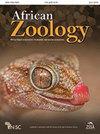Prolonged Nursing in Cape Fur Seals (Arctocephalus pusillus pusillus) at Cape Cross Colony, Namibia
IF 0.5
4区 生物学
Q4 ZOOLOGY
引用次数: 1
Abstract
Extended nursing periods have been observed in some pinniped species. Here, we document multiple cases of such prolonged nursing in Cape fur seals in Namibia. Over three separate visits to the Cape Cross breeding colony, we observed five unusual nursing interactions. These included animals of estimated age from one to over three years suckling on awake and permitting females. One of these observations included two individuals (juvenile and pup) suckling simultaneously. In three out of five cases, the female sniffed the large suckling animal, and the lack of aggression suggested mutual recognition. We suggest that the most likely scenario for these observations is that the larger animals might be the mothers' offspring from the previous year maintaining contact over at least three years. Such prolonged nursing may occur in cases where the year's pup is not born, dies or is outcompeted by older siblings, which can result in large energetic advantages for the offspring, by maintaining a feeding relationship with mothers over more than one year. We suggest that animals that extend suckling over more than one year may increase their overall success, although possibly inhibiting their mother's pregnancy in a given year. Under poorer conditions, investing more in an older calf may also be more cost effective to the mother than risking a new pregnancy. However, further detailed investigation is necessary to explain extended nursing in this socially complex mammal.纳米比亚开普克罗斯殖民地开普海豹的长期护理
在一些鳍足动物中观察到哺乳期延长。在这里,我们记录了纳米比亚角毛皮海豹长期护理的多个案例。在对Cape Cross繁殖地的三次单独访问中,我们观察到五种不同寻常的护理互动。其中包括估计年龄在1岁到3岁以上的动物,它们正在吃醒着的、允许进食的雌性动物。其中一项观察包括两个个体(幼崽和幼崽)同时哺乳。在五分之三的案例中,雌性嗅了嗅哺乳的大型动物,缺乏攻击性表明它们相互认可。我们认为,这些观察结果最有可能的情况是,较大的动物可能是母亲前一年的后代,与母亲保持了至少三年的联系。这种长时间的哺乳可能发生在当年的幼崽没有出生、死亡或被年长的兄弟姐妹打败的情况下,通过与母亲保持超过一年的喂养关系,可以为后代带来巨大的能量优势。我们认为,将哺乳时间延长一年以上的动物可能会增加它们的总体成功率,尽管可能会抑制它们母亲在特定年份的怀孕。在条件较差的情况下,对母象来说,投入更多资金养一只年龄较大的幼象也比冒着再次怀孕的风险更具成本效益。然而,需要进一步的详细调查来解释这种社会复杂哺乳动物的延伸护理。
本文章由计算机程序翻译,如有差异,请以英文原文为准。
求助全文
约1分钟内获得全文
求助全文
来源期刊

African Zoology
生物-动物学
CiteScore
2.60
自引率
9.10%
发文量
18
审稿时长
>12 weeks
期刊介绍:
African Zoology , a peer-reviewed research journal, publishes original scientific contributions and critical reviews that focus principally on African fauna in terrestrial, freshwater, and marine ecosystems. Research from other regions that advances practical and theoretical aspects of zoology will be considered. Rigorous question-driven research in all aspects of zoology will take precedence over descriptive research. The Journal publishes full-length papers, critical reviews, short communications, letters to the editors as well as book reviews. Contributions based on purely observational, descriptive or anecdotal data will not be considered.
The Journal is produced by NISC in association with the Zoological Society of South Africa (ZSSA). Acceptance of papers is the responsibility of the Editors-in-Chief in consultation with the Editors and members of the Editorial Advisory Board. All views expressed are those of the author and not necessarily those of the Editors or the Department.
 求助内容:
求助内容: 应助结果提醒方式:
应助结果提醒方式:


